Business
FrieslandCampina WAMCO: Langat Speaks On Revolutionizing Dairy Sector, Benefits

FrieslandCampina WAMCO: Langat Speaks On Revolutionizing Dairy Sector, Benefits
Known in multinational circles as a turnaround business strategist, the Managing Director of FrieslandCampina WAMCO and Sub-Saharan Africa Cluster, Ben Langat, has maintained steam in the sustainable dairy breakthroughs that the firm has championed in more than a decade.
Since 2010 and still counting, FrieslandCampina WAMCO has invested over N21 billion in the Nigerian dairy sector even as the dairy giant continues to lead the transformation of the sector. Media visits to the dairy development sites of the firm across several states in the country show how the lives, living and livelihoods of thousands of farmers, their wives and children have gradually upscaled; improving their nutrition, health, earnings and access to child education, among other benefits that had eluded them for decades.
Thriving on its corporate commitment of nourishing Nigerians with quality dairy products, FrieslandCampina WAMCO continues to help solve issues of malnutrition, poverty, herders and farmers’ incessant clashes, as well as promote sustainable dairy practices through intense and creative backward integration.
The company has created over 100,000 employment opportunities, directly and indirectly through on-farm and off-farm activities; improved the livelihood of over 12,000 smallholder dairy farmers and pastoralists, which they have organized into cooperatives and integrated them into FrieslandCampina WAMCO’s fresh milk supply chain, which provides for the local dairy farmers guaranteed incomes and market access all-year round.
FrieslandCampina WAMCO provided access to potable water for communities and livestock with the construction of 109 solar-powered boreholes and proficient extension services for value chain actors; extensive farmer2farmer training where Dutch farmers visit Nigeria to train local farmers on animal health, hygienic milking, and best global dairy practices.
Besides developing productivity and efficiency in farm management, FrieslandCampina WAMCO is the highest off-taker of fresh milk produced locally for manufacturing in Oyo, Osun, Ogun, Kwara and Ondo and have spread their footprints into northern Nigeria as champions of the nation’s march towards a prosperous and self-sufficient dairy industry.
Speaking to the media recently, the eminent dairy management maestro, Langat fielded these questions among others, thus lending credence to the impact his company has made in the dairy sector…
How do you sustain local content for your products?
To grow high milk-yielding cows, you have to put in extra effort like we have been doing for over 12 years. FrieslandCampina WAMCO is the highest off-taker of fresh milk produced locally from five states in Nigeria. Our Yoghurt factories are running on local milk, so we can say we have brands that are 100% Nigerian in our portfolio. However, to be able to meet the total dairy nutrition demands in a country as large as Nigeria, the local milk currently available is still very much inadequate. In my opinion, the model that the country will run will still have a reasonable mix of importation of some of the raw materials, while local content is developed over a period of time.
What impact do your dairy activities have in your host communities?
We are doing all the right things if you look at it from the employment perspective. Among the 12,000 farmers we work with, there are about 1500 Fulani women who had been at home but today, they are productive and are being paid regularly for raw milk and their families are much more prosperous than before – the farmers, their wives and children. In some cases, their mud huts have been rebuilt to brick houses and their children now go to school, which they could not afford before.
How have you dealt with the paucity of Forex and threats of insecurity?
We have had to restrict our Forex needs as much as we can and also source it by any means legal. We sometimes source from commercial banks in addition to whatever the Central Bank is able to make available. Also, some of our service providers are able to source Forex and supply us products in Naira. This invariably means that the cost of raw materials will go up and ultimately affect the retail prices of our products. On insecurity, we have regular conversations with relevant government security agencies. We will never risk the lives of our people. Where we have security challenges around areas where we operate, we pull out for the time being like the case of the Bobi Reserve in Niger State. We had to withdraw from the location due to banditry in order not to risk the lives of our people. We are now in eight states in Nigeria; we work with 23 dairy cooperatives; we collect more than 40,000 litres of milk daily at peak periods and we have best-in-class raw milk quality, one of the best in Africa.
BIO: Bernard Cheruiyot Langat joined FrieslandCampina WAMCO Nigeria in 2017 as the Managing Director and in July 2021, his role was expanded to Sub-Saharan Africa Cluster. He has over 30 years’ experience having worked in leading multinationals – Unilever, Coca Cola Hellenic – and across African markets in Kenya, Malawi, Ghana and Nigeria, where he has consistently led businesses to accelerate performance and build long term growth strategies, and has delivered impressive results even during volatile times.
Business
Nigeria’s Inflation Drops to 15.10% as NBS Reports Deflationary Trend

Nigeria’s headline inflation rate declined to 15.10 per cent in January 2026, marking a significant drop from 27.61 per cent recorded in January 2025, according to the latest Consumer Price Index (CPI) report released by the National Bureau of Statistics.
The report also showed that month-on-month inflation recorded a deflationary trend of –2.88 per cent, representing a 3.42 percentage-point decrease compared to December 2025. Analysts say the development signals easing price pressures across key sectors of the economy.
Food inflation stood at 8.89 per cent year-on-year, down from 29.63 per cent in January 2025. On a month-on-month basis, food prices declined by 6.02 per cent, reflecting lower costs in several staple commodities.
The data suggests a sustained downward trajectory in inflation over the past 12 months, pointing to improving macroeconomic stability.
The administration of President Bola Ahmed Tinubu has consistently attributed recent economic adjustments to ongoing fiscal and monetary reforms aimed at stabilising prices, boosting agricultural output, and strengthening domestic supply chains.
Economic analysts note that while the latest figures indicate progress, sustaining the downward trend will depend on continued policy discipline, exchange rate stability, and improvements in food production and distribution.
The January report provides one of the clearest indications yet that inflationary pressures, which surged in early 2025, may be moderating.
Bank
Alpha Morgan to Host 19th Economic Review Webinar

Alpha Morgan to Host 19th Economic Review Webinar
In an economy shaped by constant shifts, the edge often belongs to those with the right information.
On Wednesday, February 25, 2026, Alpha Morgan Bank will host the 19th edition of its Economic Review Webinar, a high-level thought leadership session designed to equip businesses, investors, and individuals with timely financial and economic insight.
The session, which will hold live on Zoom at 10:00am WAT and will feature economist Bismarck Rewane, who will examine the key signals influencing Nigeria’s economic direction in 2026, including policy trends, market movements, and global developments shaping the local landscape.
With a consistent track record of delivering clarity in uncertain times, the Alpha Morgan Economic Review continues to provide practical context for decision-making in a dynamic environment.
Registration for the 19th Alpha Morgan Economic Review is free and can be completed via https://bit.ly/registeramerseries19
It is a bi-monthly platform that is open to the public and is held virtually.
Visit www.alphamorganbank to know more.
Business
GTBank Launches Quick Airtime Loan at 2.95%

GTBank Launches Quick Airtime Loan at 2.95%
Guaranty Trust Bank Ltd (GTBank), the flagship banking franchise of GTCO Plc, Africa’s leading financial services group, today announced the launch of Quick Airtime Loan, an innovative digital solution that gives customers instant access to airtime when they run out of call credit and have limited funds in their bank accounts, ensuring customers can stay connected when it matters most.
In today’s always-on world, running out of airtime is more than a minor inconvenience. It can mean missed opportunities, disrupted plans, and lost connections, often at the very moment when funds are tight, and options are limited. Quick Airtime Loan was created to solve this problem, offering customers instant access to airtime on credit, directly from their bank. With Quick Airtime Loan, eligible GTBank customers can access from ₦100 and up to ₦10,000 by dialing *737*90#. Available across all major mobile networks in Nigeria, the service will soon expand to include data loans, further strengthening its proposition as a reliable on-demand platform.
For years, the airtime credit market has been dominated by Telcos, where charges for this service are at 15%. GTBank is now changing the narrative by offering a customer-centric, bank-led digital alternative priced at 2.95%. Built on transparency, convenience and affordability, Quick Airtime Loan has the potential to broaden access to airtime, deliver meaningful cost savings for millions of Nigerians, and redefine how financial services show up in everyday life, not just in banking moments.
Commenting on the product launch, Miriam Olusanya, Managing Director of Guaranty Trust Bank Ltd, said: “Quick Airtime Loan reflects GTBank’s continued focus on delivering digital solutions that are relevant, accessible, and built around real customer needs. The solution underscores the power of a connected financial ecosystem, combining GTBank’s digital reach and lending expertise with the capabilities of HabariPay to deliver a smooth, end-to-end experience. By leveraging unique strengths across the Group, we are able to accelerate innovation, strengthen execution, and deliver a more integrated customer experience across all our service channels.”
Importantly, Quick Airtime Loan highlights GTCO’s evolution as a fully diversified financial services group. Leveraging HabariPay’s Squad, the solution reinforces the Group’s ecosystem proposition by bringing together banking, payment technology, and digital channels to deliver intuitive, one-stop experiences for customers.
With this new product launch, Guaranty Trust Bank is extending its legacy of pioneering digital-first solutions that have redefined customer access to financial services across the industry, building on the proven strength of its widely adopted QuickCredit offering and the convenience of the Bank’s iconic *737# USSD Banking platform.
About Guaranty Trust Bank
Guaranty Trust Bank (GTBank) is the flagship banking franchise of GTCO Plc, a leading financial services group with a strong presence across Africa and the United Kingdom. The Bank is widely recognized for its leadership in digital banking, customer experience, and innovative financial solutions that deliver value to individuals, businesses, and communities.
About HabariPay
HabariPay is the payments fintech subsidiary of GTCO Plc, focused on enabling fast, secure, and accessible digital payments for individuals and businesses. By integrating payments and digital technology, HabariPay supports innovative services that make everyday financial interactions simpler and more seamless.
Enquiries:
GTCO
Group Corporate Communication
[email protected]
+234-1-2715227
www.gtcoplc.com
-

 celebrity radar - gossips6 months ago
celebrity radar - gossips6 months agoWhy Babangida’s Hilltop Home Became Nigeria’s Political “Mecca”
-

 society6 months ago
society6 months agoPower is a Loan, Not a Possession: The Sacred Duty of Planting People
-

 society5 months ago
society5 months agoReligion: Africa’s Oldest Weapon of Enslavement and the Forgotten Truth
-

 news6 months ago
news6 months agoTHE APPOINTMENT OF WASIU AYINDE BY THE FEDERAL GOVERNMENT AS AN AMBASSADOR SOUNDS EMBARRASSING











